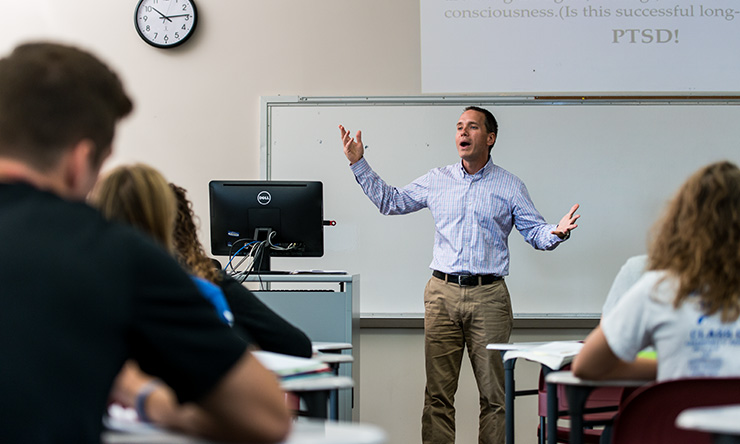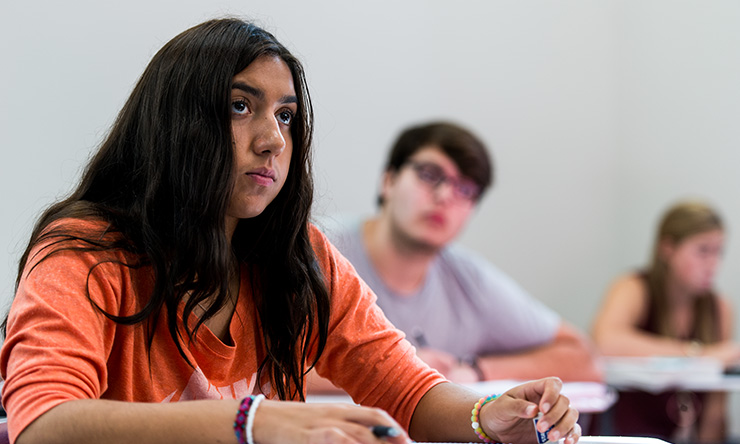Behavioral Neuropsychology
Discover the biological meaning behind behaviors, delve into research with your classmates, and help solve the mysteries behind the mind-body problem. Start your journey into this cutting-edge field at St. Ambrose.
Our graduates work at the Veterans Administration, Lutheran Social Services of Illinois, Families First Counseling Services, Quad Cities Autism Center, and U.S. District Court, Southern District of Iowa.
Ambrose Advantages
- Local Internship Possibilities
- Strong Mentor Relationships
- Meaningful and Formative Experiences
- Student Research Project



Through unique courses, research experiences, and immersive internships, St. Ambrose prepares you to reach your goals – and beyond. Our Psychology faculty have diverse expertise in research and clinical practice to help you grow, hone, and apply your skills, whether you want to pursue an advanced degree or directly enter the workforce.
Read Our Behavior Psychology Fact Sheet (pdf)
More Information About the Behavioral Neuropsychology Program
Behavioral Neuropsychology explores several subjects - including psychology, biology, and chemistry - and weaves them together to determine behavior. You'll study the organization and function of the nervous system and its relationship to behavior, cognition, and disorders.
Our faculty has diverse experience in psychological research and clinical practice, which allows us to offer unique courses, research experiences, and internships that go far beyond traditional undergraduate programs.
Throughout your education, you will benefit from strong relationships with psychology faculty members who share their expertise in experimental, clinical/counseling, neuroscience, and forensic areas. Best of all, they believe their job is to teach and mentor.
Starting in your first year, you meet with a faculty member at least once a semester – or as often as needed – to discuss your goals and ways to enhance your education. Their guidance continues through your senior year, as you prepare for a career or graduate school.
There are so many! Here's just a few:
- Gain hands-on research experience through the SAU Summer Research Institute.
- Our internships and field experience go beyond shadowing professionals. With more than 90 health and human services organizations in the Quad Cities, you have a variety of placement options.
- Next, shoot even higher. Behavioral Neuropsychology majors have completed the prestigious University of Iowa Interdisciplinary Summer Undergraduate Research Program in Neuroscience.
- Join Psi Chi, the International Honor Society in Psychology.
- Join the Psychology Club, which holds joint meetings and events with the SAU Psi Chi Chapter.This gives you the ability to make a larger impact.
- Get involved and support organizations in the community, such as the National Alliance on Mental Illness (NAMI).
- St. Ambrose hosts a large number of conferences and lectures on topics that will expand your learning and worldview.
You've heard people say it before: "College will be the greatest time of your life!" With Study Abroad, you can add even more to your college years.
You can study in another country in a semester-long or short-term study abroad program (with a few offered during spring and winterim breaks). No matter the duration, these trips deepen your professional education while earning credit toward graduation.
There are also opportunities through an exchange program, an overseas internship, or volunteering. The limits for Study Abroad are only ones you set for yourself! SAU students have studied in Italy, Costa Rica, Australia, Korea, United Kingdom, Spain, Ecuador, Japan, Germany, Peru, Cyprus, Croatia, Belize, Canada, Chile, and more.
SAU students returning from their Study Abroad locations talk about their time away as life-changing – personally, emotionally, culturally, and academically.
Click here to search our Study Abroad programs, and for general information click here.
Largely a research field, you can become employed right out of college or pursue a graduate program. But because Behavioral Neuropsychology involves chemistry, biology, genetics, and environment, your opportunities are equally as broad!
Jobs include working in research labs, bioinformatics, neurotoxicology, conducting behavior evaluation, and many others.
Your job may also involve working directly with patients in a clinic setting.
Jennifer Best, MS Ed, Dept. Coordinator, Lecturer
Andy Kaiser, PhD, Professor
Judy Correa Kaiser, PhD, Professor
Julie Jenks Kettmann, PhD, Professor, Dept. Chair
Katrina Okerstrom-Jezewski, Asst. Professor
John Stachula, PhD, Professor
Katie Trujillo, PhD, Professor
Degree Requirements
All courses are 3 credits unless otherwise noted.
View psychology courses and descriptions in the online course catalog
Required:
Core Courses:
+PSYC 105 Introductory Psychology
PSYC 215 Research Methods
PSYC 255 Brain and Behavior
PSYC 340 Cognitive Psychology
PSYC 403 Behavioral Neuropsychology
STAT 213 Applied Statistical Reasoning for the Sciences
Category A (take two)
PSYC 330 Psychology of Learning
PSYC 332 Tests and Measurements
PSYC 360 Behavioral Pharmacology
PSYC 402 Psychology of Sensation and Perception
Category B (take one)
PSYC 350 Health Psychology
PSYC 324 Abnormal Psychology
PSYC 212 Lifespan Development
Category C (take at least 3 credits)
Take any PSYC 300- or 400-level course
Capstone
WI-PSYC 404 Experimental Design in Psychology, 2 credits
WI-PSYC 405 Experimental Design in Psychology, 2 credits
Non-departmental Requirements
12 credits of Biology: One semester of Introductory Biology (101 OR 199) and two semesters of Anatomy & Physiology (230 &232)
4 credits of Chemistry: CHEM 103 Principles of Chemistry or CHEM 105 Generaly Chemistry I
3 credits of Computer Science: CSCI 140 Foundations of Computer Science, CSCI 195 Programming I, or CSCI 281 Discrete Structures
+ satisfies a general education requirement
WI writing intensive
This is the suggested plan of study to graduate in four years with a degree in Behavioral Neuropsychology. This plan assumes the student has not satisfied the foreign language requirement (three years of foreign language in high school).
Some courses need prerequisites. Check the online course catalog.
Year One
| Fall | Credit | Spring | Credit |
|---|---|---|---|
| ENGL 101 Composition | 3 | Oral Communication | 3 |
| MATH 171 Elementary Functions | 3 | PSYC 215 Research Methods | 3 |
| Foreign Language 101 | 3 | Catholic Intellectual Tradition | 3 |
| PSYC 105 Introductory Psychology | 3 | Foreign Language 102 | 3 |
| KIN Activity | 1-2 | *Liberal Arts Perspective | 3 |
| New Student Seminar | 1 | **Experiential Learning | N/A |
| KIN 149 Wellness Concepts | 1 | Information Literacy | 1 |
| Total Credits | 15-16 | Total Credits | 16 |
Year Two
| Fall | Credit | Spring | Credit |
|---|---|---|---|
| Liberal Arts Perspective: Natural Science BIOL 101+Lab or BIOL 199+Lab | 4 | *Liberal Arts Perspective (Gen Ed) | 3 |
| STAT 213 Applied Stats/Science | 3 | PSYC 255 Brain and Behavior | 3 |
| Catholic Intellectual Tradition (Gen Ed) | 3 | **Experiential Learning | N/A |
| CSCI 140, 195, or 281 | 3 | PHIL/THEO 300 Level (Gen Ed) | 3 |
| **Experiential Learning | N/A | WI Course (200 or 300 any department) | 3 |
| *Liberal Arts Perspective (Gen Ed) | 3 | ||
| Total Credits | 16 | Total Credits | 15 |
Year Three
| Fall | Credit | Spring | Credit |
|---|---|---|---|
| PSYC 340 Cognitive Psychology | 3 | PSYC 350, 212, or 324 | 3 |
| PSYC 402 Sensation and Perception | 3 | PSYC 330, 360, or 332 | 3 |
| PSYC 300 or 400 elective | 3 | BIOL 232+Lab | 4 |
| BIOL 230+Lab | 4 | CHEM 103+Lab or CHEM 105+Lab | 4 |
| Catholic Intellectual Tradition | 3 | **Experiential Learning | N/A |
| **Experiential Learning | N/A | ||
| Total Credits | 16 | Total Credits | 14 |
Year Four
| Fall | Credit | Spring | Credit |
|---|---|---|---|
| WI-PSYC 404 Adv. Experimental Design I | 2 | **Experiential Learning | N/A |
| Elective/Second Major or Minor | 12 | WI-PSYC 405 Adv. Experimental Design II | 2 |
| PSYC 403 Behavioral Neuropsychology | 3 | Electives/Second Major or Minor | 12 |
| Major Field Test (Required for Graduation) | N/A | ||
| **Experiential Learning | N/A | ||
| Total Credits | 16 | Total Credits | 14 |
*Liberal Arts Perspective. History category must be from 2 different departments
**PSYC 294/394/494 Research Practicum (if taking Research course must talk to Psych Advisor); Volunteering, Psychology Club, Exploration of Graduate School)
WI=writing intensive
Scholarships and Grants
St. Ambrose offers excellent scholarships and grants, work-study and other financial aid options! Full-time students may be eligible based on your strong academic performance in college, your talent in fine arts or athletics or your demonstrated financial need as determined by the Free Application for Federal Student Aid (FAFSA). The SAU school code for the FAFSA is 001889.
ON CAMPUS
Merit-Based Scholarships
4.0 GPA: $24,000
3.75-3.99 GPA: $22,000
3.0-3.749 GPA: $20,000
2.5-2.99 GPA: $18,000
2.0-2.49 GPA: $14,000
If GPA is 2.0-2.49, additional documents and review required for admission.
OFF CAMPUS
Merit-Based Scholarships
4.o GPA: $17,000
3.75-3.99 GPA: $16,000
3.0-3.749 GPA: $15,000
2.5-2.99 GPA: $14,000
2.0-2.49 GPA: $13,000
If GPA is 2.0-2.49, additional documents and review required for admission.
ADDITIONAL INSTITUTIONAL AID
Ambrose Advantage Full-Tuition Scholarship
Pell-eligible Iowa residents, learn more here
Fr. Welch Alumni Scholarship: $500 per year
Parent is a St. Ambrose graduate
Catholic Traditions Scholarship: $1,000 per year
Students with Catholic religious denomination or plans to graduate from Catholic high school
Minority Scholarship: $500 per year
Ethnically diverse student
Athletic Scholarships: varies
Performance and ability
Fine Arts Scholarships: varies
Performance and ability in music, art and theatre
Faith Learning Justice Campus Ministry Scholarships: $2,000 per year
Recognition of involvement in church and community service and interest in strengthening faith and growing as a leader in campus ministry
Scholarships are determined by unweighted GPA, and are renewable for four years of undergraduate student. Increases in scholarship awards due to change in GPA will be reviewed until March 1.
Grants are money that you don't repay, and they can come from government or private sources. SAU receives all financial aid funds directly - including loans and grants - then applies them to your account: once in the fall term and once in the spring term. Grants can be used to cover your tuition, books, and housing costs. You must apply for grants each academic year. If you have any loan funds in excess of your costs, you may receive a refund. If you are a first-time borrower, there is a 30-day hold on your first disbursement. For all of these grants, you must complete the Free Application Free Application for Federal Student Aid (FAFSA) as soon as it is available.
Iowa Tuition Grant
To be eligible for the Iowa Tuition Grant, you must be a resident of Iowa as defined by the State Board of Regents and currently enrolled or planning to enroll in an undergraduate degree program at an eligible Iowa college or university (SAU is eligible). Iowa College Aid administers need-based college financial aid for Iowans, such as the Iowa Tuition Grant.
Award: $7,500 maximum
Federal Pell Grant
Awarded to students of the highest need based on how much your family can contribute to your education. The U.S. Department of Education sets a threshold. Then, when you file your Free Application for Federal Student Aid (FAFSA), it computes where you land within that threshold and determines if you qualify for the grant and for how much.
Award: $6,895 maximum
Federal Supplemental Education Opportunity Grant (FSEOG)
You must file a FAFSA to qualify for a Pell Grant. This grant is awarded on a first-come, first-served basis to students who have submitted all required documents for review and in time for the review to be complete. If you are eligible for a Pell Grant or SEOG, the awards will appear on your financial aid award letter.
Award: $400 maximum
Federal Work Study
Must secure campus employment.
Award: $2,560
Federal Teacher Education Assistance for College and Higher Education (TEACH) Grant
Provides aid to students intending to teach in a high-need field at a school that serves low-income families (as determined by the U.S. Department of Education or a state education agency). Review criteria and all details here.
Award: up to $4,000
There are many opportunities to receive scholarships from outside sources, here are a few websites to begin researching your options:
- Fastweb
- College Board Scholarship Search
- Scholarships.com
- Peterson's Award Database
- Scholly (app download)
Another tip: Next time you're on campus, check out the bulletin board outside Student Financial Services where we post more flyers and applications for outside scholarships.
Katie Powers '07
Katie began her health sciences career by majoring in Behavioral Neuropsychology and continuing to graduate school in the SAU DPT program. It was at Ambrose where she discovered her fit and passion and gained the skills and confidence to land her dream job as a physical therapist at Genesis Pediatric Therapy Center, in Bettendorf, Iowa.
Read Katie's Story

Katie Powers
BS in Behavioral Neuropsychology '07; Doctor of Physical Therapy,Physical Therapist, Genesis Pediatric Therapy Center, Bettendorf,Class of 2008
At SAU, Katie completed three, 10-week clinical rotations, which put her education to the test and boosted it, too. Through our DPT program, she discovered her fit and passion, and gained the skills and confidence to land her dream job as a physical therapist at Genesis Pediatric Therapy Center, in Bettendorf, Iowa.
Contact
Jennifer Best, MS Ed, CFLE, CFCS-HDFS, BCC
Psychology Department
518 W. Locust St.
Davenport, IA 52803
563-333-6199
BestJenniferA@sau.edu
